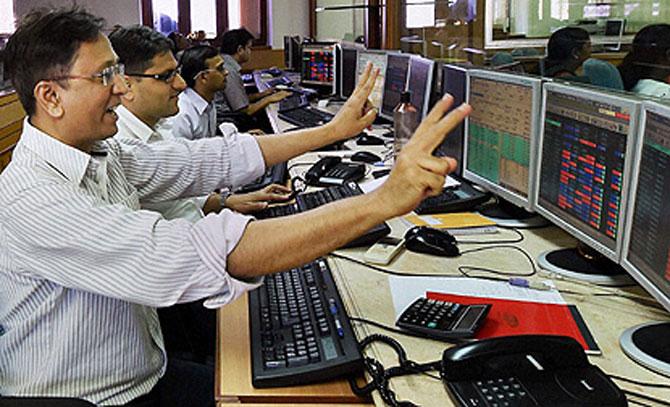Many stock market investors are like Abhimanyu. They know how to enter a stock, but fail miserably when it comes to exiting, says Sunil Damania.

In the Mahabharata, Abhimanyu, son of Arjun, knew how to enter the chakravyuha but was not aware of how to exit it.
This cost him his life.
Many stock market investors are like Abhimanyu.
They know how to enter a stock, but fail miserably when it comes to exiting.
Unless investors get both their entry and exit strategies right, even if they buy a scrip at the right level, chances are they will not make money from it.
Ask investors who bought Vakrangee, P C Jewellers, or Manpasand Beverages.
All these stocks had moved up substantially, but investors who did not sell at the appropriate time are sitting on huge losses today.
Investors live in the hope that the company they hold will be a mega performer.
They think that a stock that has fallen will bounce back soon.
Often, this hope is belied.
A scrip may take more than a decade to regain investors' fancy.
And sometimes it never touches its previous peak, as in the case of Suzlon.
Investors get anchored to a particular price level.
Once they have seen higher prices, they become reluctant to sell a stock at a lower price, assuming the fall is temporary and the price will recover.
Often that never happens.
This tendency to get anchored causes them to lose out on opportunities to book mega profits.
While there are no sure shot answers to when is it the right time to sell a stock, here is a checklist that will tilt the odds in your favour.
When all is well with a company
The maximum number of 'buy' calls are given when everything is going right with a company.
The media, too, carries positive stories, building the promoters or chief executives of such companies into superheroes.
Good publicity lures more investors to buy, driving the share price further up.
When you see a very high number of 'buy' calls accompanied by glowing media coverage, it signifies that the company's share price is close to the peak.
All positives have already been factored into the price.
If you buy at this stage, you get a stock that may not climb much further but could head downward.
Among the best times to sell a stock is when everything is going right for the company.
When a sector is hot
Investors often believe that while the other stocks in the hot sector have moved up, the one they have zeroed in on still has some steam left, and is hence a good buy.
A few years ago, non-banking financial company (NBFC) was a sector everyone wanted exposure to.
Prior to that, pharma was the most sought-after sector.
Companies belonging to the NBFC sector are struggling to hold on to the market caps they commanded prior to the IL&FS crisis.
The pharma sector has under-performed for the past several years.
When fancy for a sector is at its peak, it is usually a good time to reduce exposure to it.
Let me cite a few examples.
Many investors increased their allocation to tech stocks in 1999-2000 when the sector was about to peak.
The same happened with the infrastructure sector in 2007-08.
Several mutual funds also launched new sectoral schemes at the peak of these cycles to garner funds from investors.
Needless to say, these schemes under-performed in a big way.
Become circumspect when a particular sector begins to attract a disproportionate amount of attention from analysts and the media.
Regression to mean
The law of gravity applies as much to the stock market as it does to the physical world.
A stock that has moved up will come down eventually, though one does not know when that will happen.
If a scrip has moved up a lot over the past 10 years, the probability of it under-performing increases.
Nonetheless, investors tend to chase stocks that have moved up the most.
Regression towards the mean happens more often than not.
Here is one example.
Larsen and Toubro was one of the best-performing stocks in the 2007-08 rally.
Its adjusted price rose from Rs 20 in 2001 to Rs 1,000 in 2007.
But since then the stock has struggled to give meaningful returns.
Over the past 12 years, its compounds annual return has been a meagre 2.50 per cent.
Thus, even the best of companies is not immune to the phenomenon of regression to mean.
Corporate governance issues
Nowadays investors have become ultra-sensitive to corporate governance issues.
The moment they smell a rat, they dump the company's stock at whatever price they can get and stampede for the exit.
Manpasand Beverages and Vakrangee have fallen drastically in the recent past after corporate governance issues came to the fore.
The same story is now getting repeated with CG Power.
The moment you get a whiff of corporate governance-related trouble, move out immediately even if it means incurring a loss.
Debt rising faster than market cap
In this VUCA -- volatile, uncertain, complex and ambiguous -- world, debt connotes risk.
Higher the debt, higher the possibility that the company could run into problems.
Some of the best wealth creators in the past few years have been those that have either zero or negligible debt -- companies like TCS, Asian Paints, HUL, and so on.
Of course, this does not apply to NBFCs or banks for whom debt is the raw material.
Debt-to-market cap should be less than one.
Lower the number, safer is the company.
The moment you see this ratio inching up, move out as the probability of under-performance of the scrip increases.
A company's share price could move up after you have exited it.
Don't repent.
No one is able to sell shares at the peak.
In fact, avoid looking at the share price of that company for six months after selling.
Do so only if there is a compelling reason to track the stock.
Instead, focus on the companies you hold.
Remember that profits booked are more important than book profits.
Finally, bear in mind that the effectiveness of your exit strategy will determine the quantum of wealth you are able to generate in the equity market.
Sunil Damania is chief investment officer, MarketsMojo.com












 © 2025
© 2025